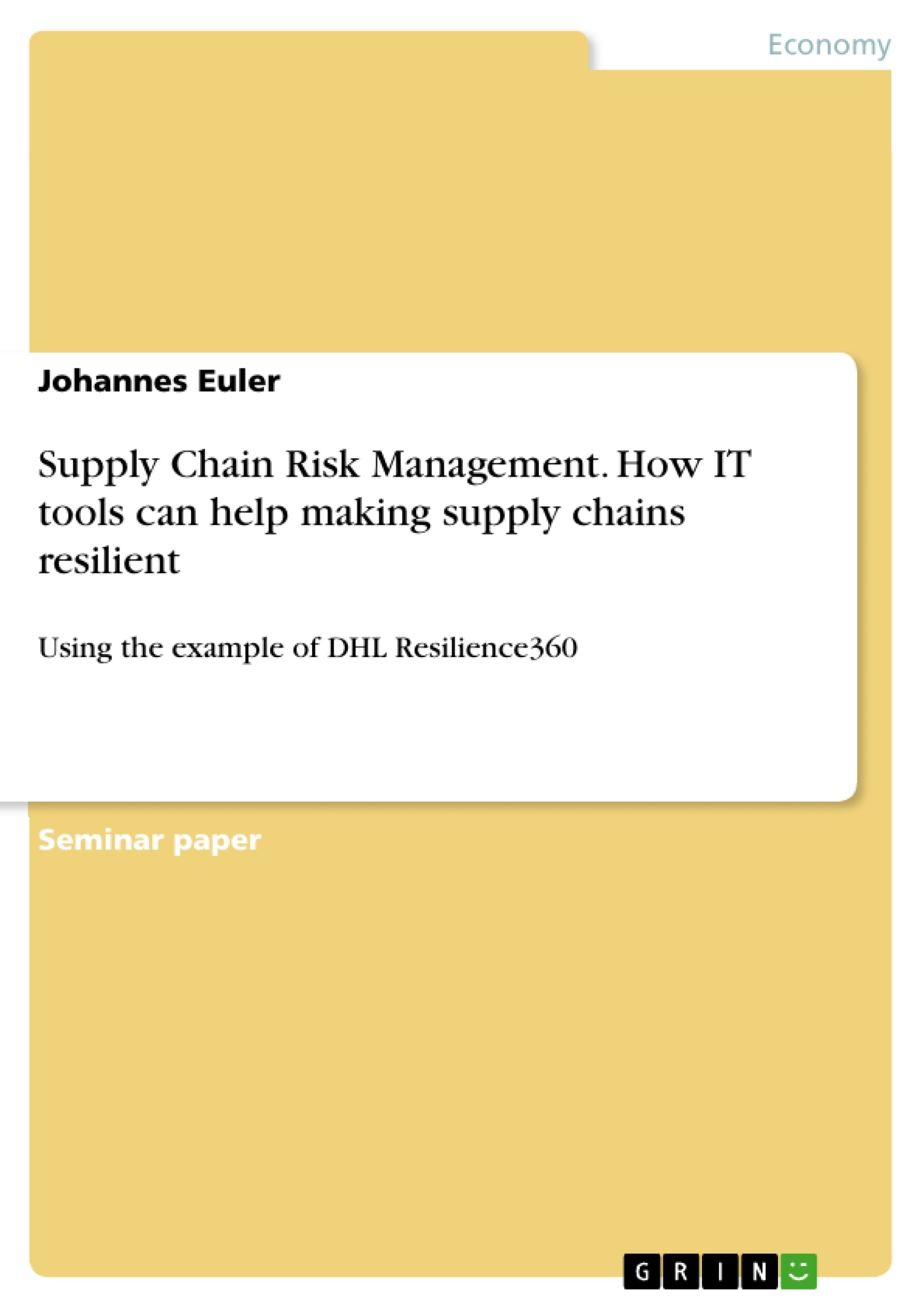Driven by a high intensity of competition, modern companies have put much effort into reducing costs in their supply chain. Two important trends on the way to achieving that goal are globalization and lean management. Both have led to complex, highly distributed supply chains and low buffer stocks. Indeed, these mechanisms brought lower costs but at the same time an increase of vulnerability and risk in modern supply chains.
Unexpected disruptions in supply chains can cause a huge impact on businesses, such as high financial expenses and supply delays on the short-term, but also negative brand reputation and falling investor confidence on the long-term. This is why the implementation of the approaches “supply chain risk management (SCRM)” and “business continuity management (BCM)” has become crucial in the sphere of top-level management. Digitization is another disruptive trend within the present economic system. The volume of available data for businesses has been increasing exponentially in the last years. But at the same time most companies have failed using these data, essential in decision-making process. These unused data offer great potential: With Big Data Analytics they could turn companies’ supply chain risks into a competitive advantage.
This case study deals, in virtue of the quote from JFK, with the research question: “How can IT tools support companies making their supply chains resilient?” To this effect, the first chapter describes key risks in modern supply chain in order to create a general awareness of the scope of SCRM and BCM approaches. The next chapter then compares two common supply chain strategies with a focus on resilience in order to evaluate the proposed solution at the end of this case study. Thereupon Chapter 4 answers the research question of this case study by comprising the key components of the SCRM solution “DHL Resilience 360”. The last chapter evaluates the proposed solution based on the output of Chapter 3 on the one hand, and on own practical considerations on the other hand.
Inhaltsverzeichnis (Table of Contents)
- Introduction
- Risks in modern supply chains
- Supply Chain Management Risk Strategies
- DHL Resilience360
- Risk Assessment
- Incident Monitoring
- Risk Response
- Evaluation of the proposed solution
- Sources
Zielsetzung und Themenschwerpunkte (Objectives and Key Themes)
This case study aims to explore how IT tools can enhance supply chain resilience using the example of DHL Resilience360. It investigates the key risks present in modern supply chains and examines different supply chain management strategies with a focus on resilience.
- Supply chain risk management (SCRM)
- Business continuity management (BCM)
- Resilient supply chain strategies
- The role of IT tools in supply chain resilience
- The application of DHL Resilience360 as a SCRM solution
Zusammenfassung der Kapitel (Chapter Summaries)
- Introduction: This chapter introduces the research question, highlighting the increasing vulnerability of modern supply chains due to globalization and lean management practices. It emphasizes the importance of SCRM and BCM approaches in mitigating supply chain disruptions.
- Risks in modern supply chains: This chapter explores various risks that modern supply chains face, including disruptions, financial expenses, and reputational damage. It emphasizes the need for proactive risk management strategies.
- Supply Chain Management Risk Strategies: This chapter compares different supply chain risk management strategies, focusing on their effectiveness in building resilience. It provides a framework for evaluating the proposed solution in the case study.
- DHL Resilience360: This chapter delves into the key components of DHL Resilience360, a SCRM solution. It examines its features, including risk assessment, incident monitoring, and risk response capabilities.
Schlüsselwörter (Keywords)
This case study focuses on supply chain risk management (SCRM), business continuity management (BCM), supply chain resilience, IT tools, Big Data Analytics, DHL Resilience360, risk assessment, incident monitoring, and risk response.
Frequently Asked Questions
What is Supply Chain Risk Management (SCRM)?
SCRM involves identifying, assessing, and mitigating risks within a supply chain to ensure business continuity and reduce vulnerability to disruptions.
How do globalization and lean management affect supply chain risk?
While they reduce costs, they also lead to more complex, distributed networks and lower buffer stocks, making supply chains more vulnerable to unexpected events.
How can IT tools improve supply chain resilience?
IT tools like Big Data Analytics and platforms like DHL Resilience360 provide real-time monitoring, risk assessment, and faster response capabilities during disruptions.
What are the main components of the DHL Resilience360 solution?
The solution focuses on three key areas: Risk Assessment, Incident Monitoring, and Risk Response to help companies manage their supply chain proactively.
What are the long-term impacts of supply chain disruptions?
Beyond immediate financial losses, disruptions can damage a brand's reputation and lead to a significant drop in investor confidence.
- Citar trabajo
- Johannes Euler (Autor), 2017, Supply Chain Risk Management. How IT tools can help making supply chains resilient, Múnich, GRIN Verlag, https://www.grin.com/document/355694



